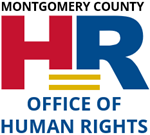Mediation Program
The Montgomery County Office of Human Rights gives parties involved in discrimination cases the opportunity to attend a mediation session to discuss and resolve their dispute. Mediation is increasingly viewed as an effective tool to handle conflict. Successful mediation will result in a settlement of the complaint(s) and closure of the file. If settlement is not reached in mediation, the case will continue through the normal investigation process.
What is Mediation?
- Mediation is a way to explore the issues and concerns without an investigation.
- Mediation is confidential; no one outside of mediation will know what parties discussed.
- The mediation session is not part of the investigation docket, so the investigator is not involved in the mediation.
- The mediator is neutral and does not represent either party.
- The parties decide whether there will be a settlement.
What are the Advantages of Mediation?
Mediation can save time. Mediation can help the parties put the dispute behind them quickly. A mediation session can be scheduled and held within two months after the discrimination complaint is filed. On the other hand, an investigation is a much lengthier process that may take one to two years to be completed. The advantages of mediation are provided below.
- Mediation can save money. The MC-OHR does not charge either party a fee to participate in the mediation session. Mediators provide the parties an opportunity to resolve the dispute before spending a lot of time and money to prepare or defend a case. A party does not need an attorney to participate in mediation; a party may choose to have or not have an attorney at the mediation session.
- Mediation is informal. The objective of mediation is not to present evidence. The mediator does not weigh evidence or make findings about facts or violations. The mediator does not make the decision but can offer suggestions or options.
- Mediation is professional. Trained mediators are obtained from various sources, including the Bar Association of Montgomery County. The mediator is a neutral facilitator and does not decide the dispute. A language interpreter can be used upon request.
- Mediation can be effective. Mediation gives both parties the chance to give their side of the story and to inform the mediator of what they want from the mediation process. It allows the parties to be heard and to hear each other's concerns. Importantly, mediation gives parties the opportunity to work toward an agreement that satisfies the interests of both/all parties.
What happens if we reach Settlement?
- The parties and mediator work together writing the settlement agreement.
- The settlement agreement contains a statement that there is no admission of a violation.
- The settlement agreement does not have to be signed at the mediation session; parties can have the agreement reviewed by their attorney.
- If the parties settle the complaint(s) at the mediation session, the complaints are withdrawn and the investigation case will be closed at the MC-OHR and the EEOC, if applicable.
In summary, mediation is a safe, confidential forum for participants to find their own answers with the support of a mediator. If you would like to participate in the MC-OHR Mediation program, please sign and return the form labeled MEDIATION AND CONFIDENTIALITY AGREEMENT. If you have any questions about the mediation program, please contact our office at (240) 777-8450.
